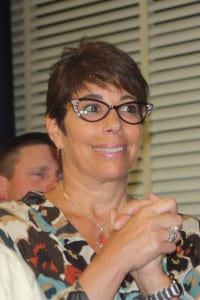By Rohma Abbas & Victoria Espinoza
Voters in the Huntington, Northport-East Northport, Harborfields and Cold Spring Harbor school districts resoundingly approved their districts’ proposed 2015-16 budgets and elected a number of newcomers to local school boards.
Both Harborfields and Northport-East Northport school board races had contests this year — in Harborfields, five candidates vied for three seats, and in Northport-East Northport, a pool of seven were competing for three slots.
Huntington and Cold Spring Harbor had races in which trustees ran unopposed.
Huntington
Voters in the Huntington school district approved a $120.3 million budget, 1,228 votes to 301. Proposition 2, which allows the district to spend just over $1 million in capital reserve monies to pay for state-approved projects, passed 1,252 votes to 251.
Four people ran unopposed for re-election or election: board President Emily Rogan received 1,193 votes, board members Xavier Palacios and Tom DiGiacomo collected 1,139 votes and 1,185 votes, respectively, and newcomer Christine Biernacki garnered 1,189 votes. Rogan, Biernacki and DiGiacomo won three-year terms.
As the lowest vote getter, Palacios will serve the remaining two years on a term of former Vice President Adam Spector’s vacated seat.
“We will maintain our efforts toward achieving cost savings and efficiencies, while preserving the goal of providing students across the district with a high quality education that promotes an affinity for learning as well as college and career readiness in an increasingly global and technologically-driven society,” Superintendent Jim Polansky said in a statement.

Northport-East Northport
In Northport-East Northport, the $159.6 million budget was approved, 3,281 to 788, in a turnout that school officials there called stronger than usual. Proposition 2, which allows the district to spend $1.2 million in capital reserves, was approved 3,561 to 504. Longtime Trustee Stephen Waldenburg Jr., who has served on the board for 15 years, was voted out in a heated race against six others for three seats, amassing 1,290 votes. Incumbent David Badanes, 2,446 votes, was re-elected to another term. Candidate Tammie Topel, former school board member, got her seat back after declining to seek re-election last year, with 2,130 votes and newcomer David Stein, who championed a successful grassroots parental movement to get full-day kindergarten included in this year’s budget, enjoyed victory to the board, with 2,548 votes.
Newcomers Peter Mainetti, Josh Muno and Michael Brunone missed the mark as well, with Mainetti garnering 1,018 votes, Muno receiving 542 votes and Brunone getting 1,039 votes.
Stein said he’s looking forward to working with his colleagues on the school board as his first order of business.
“I feel that the will of this entire community, that did great things this year, was just heard. This is what we’ve been working for. The community put kindergarten together; they did it as a community effort.”
Waldenburg said he “would’ve liked to won,” but the community has spoken.
“I’ve given it my all for 15 years and I’m grateful that I was able to serve that long,” Waldenburg said. “I appreciate it. The community wants somebody else; that’s their choice.”
Newly elected Trustee Tammie Topel and incumbent David Badanes also spoke positively about their victories.
“I feel on cloud nine. I feel really great,” Topel said.
The United Teachers of Northport, the district’s teacher’s union, endorsed the three candidates who won, according to Antoinette Blanck, the president of the union. She said she was “thrilled” the budget passed, especially because of full-day kindergarten.
Harborfields
Voters in Harborfields approved their budget with high marks — 82.5 percent voter support for an $80.5 million spending plan, with 1,442 voting in favor and 305 voting no. Voters also supported a proposition on the ballot to establish a new capital reserve fund, with 79.4 percent in favor.
Incumbents Donald Mastroianni and board President Dr. Thomas McDonagh were returned to the board, and voters elected newcomer Suzie Lustig. Mastroianni earned the most votes, at 1,017, McDonagh earned 958 votes and Lustig got 953 votes.
Candidates Chris Kelly and Colleen Rappa fell short.
Mastroianni and McDonagh are both incumbents; serving their ninth and seventh year, respectively. Lustig, a resident of the Harborfields district for 22 years, will be serving on the board for her first time.
Lustig said she wants to focus her time on making sure all students at Harborfields receive a well-rounded education that is competitive for the 21st century.
“Our school has to be of a holistic level, some children may be gifted in science or they may be gifted in music, and we need to make sure we represent everybody for a competitive environment,” Lustig said.
Lustig has served as the Harborfields Council of PTAs “Get Out the Vote” chairperson for three years now, and has served on the district’s advisory committee since 2013, as well as holding many different PTA positions since 2007.
Mastroianni, who has served on the board since 2006, believes that the biggest challenges Harborfields faces as a district are state-imposed, including the gap elimination adjustment on school district aid, a deduction from each school district’s state aid allocation that helps the state fill its revenue shortfall.
Mastroianni also hopes to focus on current district committee work regarding building usage and full-day kindergarten.
“I think full-day kindergarten is definitely possible, but we have to take a hard look at the costs and the sustainability,” Mastroianni said.
McDonagh wants to focus on many of the projects that have just begun this year, including the capital improvement bond project, and evaluating the need for facility modifications over the next few years.
“The projects being considered include both athletic facilities and educational facilities, as well as just general district facility needs like bathrooms and other facilities,” McDonagh said.
Cold Spring Harbor
In Cold Spring Harbor, voters approved a $64 million budget, 335 votes to 130. Proposition 2, which moved to spend capital reserve money on various projects, passed 318 to 107. Proposition 3, to establish a new capital reserve fund, was approved 314 to 114. Board President Anthony Paolano and Trustee Ingrid Wright ran unopposed for re-election and received 366 and 359 votes, respectively.
















